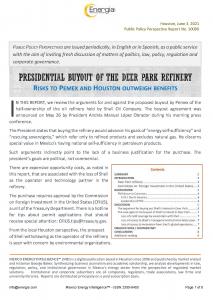AMLO’s Proposed Buyout of Shell Oil Company at the Deer Park Refinery (bilingual text)
An informal survey of oil industry sources identified concerns about the proposed purchase of Shell's 50% ownership in the oil refinery in Deer Park, Texas.
An informal survey of industry sources conducted by Mexico Energy Intelligence™ (MEI), an oil industry newsletter published in Houston, identified concerns about the proposed buyout by Pemex of the 50% ownership that has been held by Shell Oil Company since a joint venture was formed in 1993. The results of the survey will be described in a report (PPP 10080), which is currently in preparation.
“Pemex is seen as lacking the managerial and technical talent to efficiently, safely, and profitably operate the refinery on a stand-alone basis,” says the founding publisher George Baker, summarizing conversations and email communications with industry sources. “Pemex would lose access to a deep bench of managerial and technical talent and the pool of innovation that is provided by Shell’s operational experience worldwide,” he adds.
The proposed purchase became public during the press conference of President Andrés Manuel López Obrador on May 26. The president praised it as an important step toward national self-sufficiency in petroleum products. Pemex had offered US$596 million plus the value of inventory, together estimated at about $1 billion.
Wall Street, however, views the purchase darkly. The next day, Moody’s Investors Service downgraded the credit rating of the partnership, noting that by the purchase Pemex loses the rating- and credit-leverage supplied by Shell.
The deeper problem with the proposed buyout is its lack of a business justification; there is only a political narrative about the imagined benefits of national self-sufficiency in petroleum products.
There are also legal and labor issues to resolve: The counterparty to Shell is not Pemex, but a U.S. subsidiary of a Mexican subsidiary, PMI Norteamérica, S.A. de C.V., owned by Pemex via its trading subsidiary, PMI Comercio Internacional, S.A. de C.V. Pemex employees are federal civil servants, who, in that capacity, would be ineligible for work permits in commercial establishments in the United States. There are also new challenges of negotiating with the trade union United Steel Workers and U.S. environmental compliance.
In completing the purchase, Pemex would be losing the credit-leverage, technological advantage, intellectual property, and operational and marketing expertise that are being supplied by one of the premier oil companies on the planet. In addition to the sales price, Pemex would be assuming uncounted environmental, health and pension liabilities.
Discounting the narrative that “everything would be run as before,” the greater likelihood is that industrial and environmental safety in the Houston area would be compromised with Pemex as the operator; further, the profitability of the refinery would be jeopardized by higher costs of capital, insurance and compliance.
“It may be only poetically true that the value of the refinery for Pemex without Shell as its partner and the operator is its gross weight as scrap metal,” observes Baker.
The purchase awaits regulatory approval by the U.S. authorities, principally the Committee on Foreign Investment in the United States (CFIUS), an agency of the Treasury Department. There is a hotline for concerns about requests for permits that should be denied: CFIUS.tips@treasury.gov
_____________________________________
"La propuesta de compra por AMLO de la refinería de Deer Park: Perspectivas negativas" [Título]
Existe un escepticismo generalizado sobre las perspectivas operativas y financieras de la refinería en Deer Park, Texas, si la refinería pasara a estar bajo la propiedad exclusiva de Petróleos Mexicanos (Pemex), la agencia petrolera estatal de México.
Una encuesta informal de fuentes de la industria realizada por Mexico Energy Intelligence™ (MEI), un boletín de la industria petrolera publicado en Houston, identificó preocupaciones sobre la propuesta de compra por parte de Pemex de la propiedad del 50% que ha estado en manos de Shell Oil Company desde que se formó una empresa conjunta en 1993. Los resultados de la encuesta se describirán en un informe (PPP 10080) actualmente en preparación.
"Se considera que Pemex carece del talento gerencial y técnico para operar la refinería de manera eficiente, segura y rentable de manera independiente", dice el editor fundador George Baker, resumiendo conversaciones y comunicaciones por correo electrónico con fuentes de la industria. "Pemex perdería el acceso a un acervo de talento gerencial y técnico y a la innovación que proporciona la experiencia operativa de Shell en todo el mundo", agrega.
La compra propuesta se hizo pública durante la conferencia de prensa del presidente Andrés Manuel López Obrador el 26 de mayo. El presidente elogió la compra propuesta como un paso importante hacia la autosuficiencia nacional en productos petroleros. Pemex había ofrecido US$596 millones más el valor del inventario, en conjunto estimado en alrededor de US$1.000 millones.
Wall Street, sin embargo, ve la compra con pesimismo. Al día siguiente, Moody's Investors Service rebajó la calificación crediticia de la sociedad, señalando que por la compra Pemex pierde la calificación y el apalancamiento crediticio suministrados por Shell.
El problema más profundo con la compra es la falta de una justificación comercial; sólo hay una narrativa política acerca de los beneficios imaginarios de la autosuficiencia nacional en petrolíferos.
Al completar la compra, Pemex estaría perdiendo el apalancamiento crediticio, la ventaja tecnológica, la propiedad intelectual y la experiencia operativa y de marketing que está siendo suministrada por una de las principales compañías petroleras del planeta. Pemex estaría asumiendo pasivos ambientales, de salud y de pensiones no contabilizados. Descontando la narrativa de que "todo se ejecutaría como antes", la mayor probabilidad es que la seguridad industrial y ambiental en el área de Houston se vea comprometida con Pemex como el operador.
“Puede ser sólo metafóricamente cierto que el valor de la refinería para Pemex sin Shell como su socio y el operador es su peso bruto como chatarra,” observa Baker.
La compra espera la aprobación regulatoria de las autoridades estadounidenses, principalmente el Comité de Inversión Extranjera en Estados Unidos (CFIUS), una agencia del Departamento del Tesoro. Hay una línea directa para solicitudes cuestionables: CFIUS.tips@treasury.gov
George Baker
Mexico Energy Intelligence
+1 832-434-3928
email us here
Visit us on social media:
Twitter
LinkedIn
Press briefing of May 26, 2021 announcing the Deer Park purchase
Legal Disclaimer:
EIN Presswire provides this news content "as is" without warranty of any kind. We do not accept any responsibility or liability for the accuracy, content, images, videos, licenses, completeness, legality, or reliability of the information contained in this article. If you have any complaints or copyright issues related to this article, kindly contact the author above.


